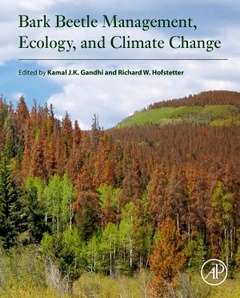Description
Bark Beetle Management, Ecology, and Climate Change
Coordinators: Gandhi Kamal J.K., Hofstetter Richard W.
Language: English
Subject for Bark Beetle Management, Ecology, and Climate Change:
Keywords
Bacteria; Bark beetles; Biodiversity; Bivoltinism; Climate; Climate change; Climate warming; Cold harden; Community; Defense; Dendroctonus; Dendroctonus frontalis; Dendroctonus ponderosae; Dendroctonus rufipennis; Dendroctonus simplex; Dendroctonus spp; Diapause; Dispersal; Drought; Drought stress; Eastern larch beetle; Ecological resilience; Ecophysiology; Extreme weather events; Forest ecosystems; Forest management; Fungal symbionts; Fungus; Globalization; Habitat availability; Host defenses; Host selection; Insect ecology; Invasion success; Ips; Ips spp; Ips typographus; Land use change; Larix laricina; Lowland conifer forests; Management; Mite; Modeling techniques; Mountain pine beetle; Nematode; Nonnative tree plantations; Norway spruce; Nutrient cycling; Ophiostomatoid fungi; Outbreak; Outbreaking insects; Phenology; Picea; Picea abies; Pinus; Pinus spp; Plant-insect interactions; Plasticity; Population dynamics; Populations; Prevention; Research needs; Salvage; Sanitation; Semiochemicals; Southeastern USA; Spatial and temporal scales; Spruce beetle; Suppression; Symbiosis; Tamarack; Temperature; Thresholds; Timber; Trade; Tree defenses; Tree mortality; Virus; Wind disturbance; Wood packaging material
438 p. · 19x23.4 cm · Hardback
Description
/li>Contents
/li>Biography
/li>Comment
/li>
Bark Beetle Management, Ecology, and Climate Changeprovides the most updated and comprehensive knowledge on the complex effects of global warming upon the economically and ecologically important bark beetle species and their host trees. This authoritative reference synthesizes information on how forest disturbances and environmental changes due to current and future climate changes alter the ecology and management of bark beetles in forested landscapes.
Written by international experts on bark beetle ecology, this book covers topics ranging from changes in bark beetle distributions and addition of novel hosts due to climate change, interactions of insects with altered host physiology and disturbance regimes, ecosystem-level impacts of bark beetle outbreaks due to climate change, multi-trophic changes mediated via climate change, and management of bark beetles in altered forests and climate conditions.
Bark Beetle Management, Ecology, and Climate Change is an important resource for entomologists, as well as forest health specialists, policy makers, and conservationists who are interested in multi-faceted impacts of climate change on forest insects at the organismal, population, and community-levels.
Part I: Insect distributions and novel hosts 1. Climate change and invasion by non-native bark and ambrosia beetles 2. Complexities in predicting mountain pine beetle and spruce beetle response to climate change 3. Responses and modeling of southern pine beetle and its host pines to climate change
Part II: Interactions of insects with altered host physiology 4. The Eurasian spruce bark beetle in a warming climate: phenology, behaviour and biotic interactions 5. Southwestern examples 6. Relationships between drought, coniferous tree physiology, and Ips bark beetles under climatic changes
Part III: Interactions of insects with altered disturbance regimes 7. Interactions between catastrophic wind disturbances and bark beetles in forested ecosystems
Part IV: Ecosystem-level impacts of bark beetle outbreaks due to climate change 8. Bark beetle outbreaks alter biotic components of forested ecosystems 9. Eastern larch beetle, a changing climate, and impacts to northern tamarack forests
Part V: Multi-trophic changes mediated via climate change 10. Effects of rising temperatures on ectosymbiotic communities associated with bark and ambrosia beetles
Part VI: Management of bark beetles in altered forests and climate conditions 11. Management strategies to reduce bark beetle impacts in North America and Europe under altered forest and climatic conditions 12. Conclusions: interactions among climate, disturbance and bark beetles affect the forest landscapes of the future
Richard Hofstetter is a Professor of Forest Entomology in the School of Forestry at Northern Arizona University in Flagstaff, Arizona. He has published extensively on bark beetle biology, symbioses, communication and host tree interactions, and is the coauthor of Bark Beetles: Biology and Ecology of Native and Invasive Species (Academic Press, 2015).
- The only book that addresses the impacts of global warming on bark beetles with feedback loops to forest patterns and processes
- Discusses altered disturbance regimes due to climate change with implications for bark beetles and associated organisms
- Led by a team of editors whose expertise includes entomology, pathology, ecology, forestry, modeling, and tree physiology




